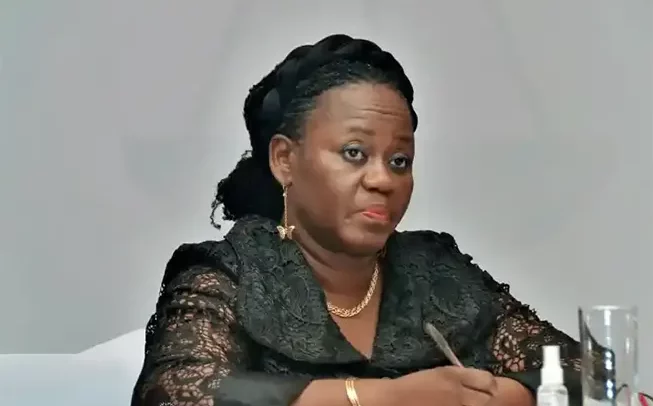Former Chief Justice Gertrude Torkornoo has filed a suit challenging her removal on the recommendation of a five-member committee set up by the President to probe three petitions filed against her.
She is seeking among others, an order setting aside the findings of the committee chaired by Justice Gabriel Pwamang and its recommendations which led to her removal as Chief Justice.
She is also seeking an “order prohibiting the consideration and appointment of a new substantive Chief Justice of Ghana.”
Justice Torkornoo is again challenging the denial of her “salary, benefit, courtesies and other entitlements” due to her before the Warrant of Removal signed by the President.
Removal
Justice Torkornoo was removed from office as Chief Justice and a Supreme Court judge on September 1, 2025, following the receipt of the report of a five-member committee that probed a petition filed against her.
She became the first ever Chief Justice to be removed from office following the recommendation of a committee probing allegations of misconduct and misbehaviour.
Prior to that, she was suspended on April 22, 2025, following the setting up of the committee to probe the three petitions calling for her removal.
The decision by President John Mahama to remove Justice Torkornoo as the head of the judiciary in line with Article 146(9) generated heated arguments from the moment the decision was announced by the Presidency.
What generated even more criticisms are the three main reasons why the Gabriel Pwamang Committee recommended that she should be removed from office.
Initial Suit
This is the second legal challenge Justice Torkornoo has mounted following her removal from office, a removal many have considered to be politically motivated.
The first one, which was filed last month, is seeking a judicial review and avers that the committee acted in excess of its mandate as it was set up to probe three petitions calling for her removal as Chief Justice and not a judge.
She argues that the Chief Justice is the administrative head of the Judiciary, a function not performed by other Justices of the Supreme Court, therefore, removal as a Chief Justice does not imply automatic removal as a Justice of the Superior Court, which includes the Supreme Court.
Latest Suit
In her latest suit filed by her lawyer, Kwabena Adu-Kusi, Justice Torkornoo argues that all of the alleged findings and grounds for recommendations of the committee set up by the President under Article 146 (6) and (7) of the 1992 Constitution “do not meet, even remotely, the standard of ‘stated misconduct, incompetence or infirmity on ground of inability to perform the functions of office’ imposed by Article 146 (1) of the 1992 Constitution as the only constitutional reasons that can lead to the removal of the Chief Justice or Justice of Superior Courts from office.”
She also argues that the findings and recommendations of the committee blatantly violate relevant provisions of the 1992 Constitution and are therefore unconstitutional and illegal.
She further argues that the committee recommending her removal for expenditure that has not been disallowed against her, nor she surcharged for it by the Auditor General is “false, misleading, irrational, unreasonable and illegal” on account of purporting to find misconduct of the Chief Justice for expenditure.
It is her case that the “legitimate expenses” on the Chief Justice’s vacation were administered and authorised by the Judicial Secretary, the Director of Finance, Director of Budget, and the Director of Audit of the Judicial Service who are the duly authorised officers that have administered the Travel Policy of the Judicial Service set by the Judicial Council for Chief Justices and Superior Court Justices since 2010.
Justice Torkornoo also argues that the second recommendation which borders on the transfer of judges is unfair, unreasonable, perverse and absurd as the Chief Justice as head of administration and supervision of the Judiciary is responsible for transferring all judges, including Superior Court Justices, and Judicial Officers of the Judicial Service.
On the third finding, Justice Torkornoo argues that the Chief Justice has a legitimate obligation to recommend Justices for national and international placements and appointments, hence, her recommendation of some judges for promotion to the Supreme Court cannot be a ground for her removal from office.
She is therefore, seeking an order quashing both the findings and recommendations of the committee as well as the Presidential Warrant dated September 1, 2025, which removed her from office as Chief Justice.
BY Gibril Abdul Razak


